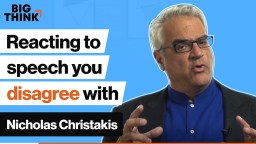JONATHAN ZIMMERMAN: At different times in American history there's been a little more room for for controversial discussion, and then it's been constricted, like in a staccato rhythm, like an accordion. So in the progressive era that preceded the First World War, there was a little bit more discussion and controversy in schools. This was the era of the current events lesson, when the newspaper industry actually promoted it, the lesson -- you'd cut out an article from a newspaper and come in and discuss it. But then the United States entered World War I, and there was a rapid and massive constricting of discussion. Because during wartime, historically in this country, speech has been limited, and it was extremely limited in schools. And then, in the interwar period, that is, in the '20s and '30s, there was a little bit more wiggle room. During the Second World War and Cold War, much more constriction. In the '60s and '70s, during the Vietnam and civil rights era, opening up a little bit, but then starting in the '80s, constricting as well. And there are different reasons for this across time. But one of the through lines that we find is that during war especially, or times of national crisis, the school boards and school officials are much more wary about allowing teachers and kids to say what they think.
There is controversy in a democracy, if you haven't noticed, especially now. And if our teachers aren't leading kids in discussions of controversies, the kids aren't going to be educated in how to have a discussion. I think especially at this moment, you turn on the TV, and you're told that after the commercial break, there's going to be a debate about some subject -- immigration, health care, whatever -- and then you watch what ensues, and you see four people shouting at each other or past each other, really a set of sequential rants. That's what our kids are going to think politics is unless our schools teach them how to engage controversial issues in a fair-minded, tolerant, and reasonable way. That's very difficult, and people won't learn to do it unless they're taught to do it. If our teachers avoid controversial questions, our kids won't get the needed experience of how to engage those questions.
If you interview American school teachers about their pre-service training, and you ask them, 'As part of your preparation to become a teacher, did your teachers or your university engage you in the question of controversial issues? That is, were you taught how to teach about them?' Most say no. And I think that anybody who's going to be a teacher should have thought about, discussed, and addressed precisely what we're talking about right now. So I'm not saying there should necessarily be, quote, "a class" on how to talk about controversial issues. But I think all disciplines are defined by controversy. English class is defined by, you know, what's love really? History class is defined by: What is a democracy when you get right down to it? These disciplines are defined by controversies, and I would say, rather than having a special class on controversy that our teachers should be prepared to engage it as it arises in the disciplines that are defined by it.
I do think that there's a danger whenever you engage in a controversial question of indoctrination -- that is, of the teacher foisting her or his opinions on the student. And frankly, this is another reason why we have to prepare teachers in this realm, because they are the adult in the room, and I don't think they have to remain neutral, but I do think that when they profess a political opinion, they have to identify it as such and also make clear to the kids in the room that the kids are not enjoined to share. So I think it's fine for a teacher to say, 'Look, I'm a political creature. Just like everyone else in America, I have political attitudes. But when I share them, I don't necessarily expect you to share them.' I think that's another way, frankly, of modeling what it means to be a democratic citizen. I have opinions. I am not a neutral person. But I also should not and do not demand that you share those opinions. My job is to help you formulate your own.
I think it's happening at every level of education. And I think one reason why in higher education we see so much self-censorship and so much fear about engaging in controversial issues, which I think is really what the safe space doctrine is about, it's about fear. I think one reason is that people come after 18 years of schooling, right? They've already had experiences -- or not -- surrounding these subjects, and it's more not. That is, they haven't been prepared in their K through 12 education in how to engage controversial questions in a mutually respectful way. So, in fact, we shouldn't be surprised that at the university level a lot of people simply avoid doing that. It's weird and scary, and it has the potential of blowing up into some social media screed or attack. Who wants that?






